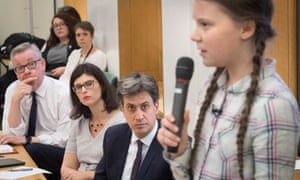Guardian Jonathan Watts | April 23, 2019

Greta Thunberg took her climate message to the heart of power in Westminster on Tuesday, with a quiet but powerful message to MPs that prompted politicians to declare contrition for their failure to act.
After the noise of Brexit in parliament and the disruption of Extinction Rebellion outside, the 16-year-old Swedish activist cut an extraordinarily composed figure as she arrived with her trademark braids, hand-painted placard and a speech that forced politicians to reflect on a crisis that is growing steadily worse despite three decades of political promises.
“This ongoing irresponsible behaviour will no doubt be remembered in history as one of the greatest failures of humankind,” she told the packed audience of MPs, officials and fellow school strikers. “You lied to us. You gave us false hope. You told us that the future was something to look forward to.”
There was no let-up for the audience. The UK, she said, was very special due to its “mind-blowing historical carbon debt”, a reference to the country’s record as the birthplace of industrialisation. But this was also, she said, because its claims of world-leading progress on cutting emissions are partly the result of “creative accounting” and are belied by the government’s plans for more high-emissions projects.
“The UK’s active current support of new exploitation of fossil fuels, like for example the UK shale gas fracking industry, the expansion of its North Sea oil and gas fields, the expansion of airports, as well as the planning permission for a brand new coalmine, is beyond absurd,” she said.
She finished to a standing ovation and cheers, then sat quietly as the panel of senior politicians gave their responses. Several appeared chastened.
“Your voice – still, calm and clear – is like the voice of our conscience,” said the environment secretary, Michael Gove. “When I listened to you, I felt great admiration, but also responsibility and guilt. I am of your parents’ generation, and I recognise that we haven’t done nearly enough to address climate change and the broader environmental crisis that we helped to create.”
Ed Miliband, the Labour politician who led the UK’s delegation to the 2009 Copenhagen climate summit and oversaw the UK Climate Act, said he recognised that what was done in the past has been proven by science not to be enough. “You have woken us up. We thank you. All the young people who have gone on strike have held up a mirror to our society … you have taught us all a really important lesson. You have stood out from the crowd.”
Thunberg listened attentively, applauding only when a member of audience criticised the government for pushing ahead with fracking. Her mantra when dealing with governments has been consistent: Never mind the words. Nothing matters apart from actions to halt emissions.
The big test on this will come on 2 May, when the climate change committee announces the results of a review of the UK’s targets, including when the country should aim to reach net zero emissions. This was prompted by the United Nations Intergovernmental Panel on Climate Change report last year, which warned of the dangers of global warming exceeding 1.5C above pre-industrial levels. The recent surge of demands for more ambition – on the streets, from the Bank of England governor, Mark Carney, and from David Attenborough – have helped to amplify the message that Greta and others are stressing with their climate strikes.
Tuesday saw other signs of progress that would have been hard to imagine a year ago. Caroline Lucas, the former leader of the Green party, announced that during Greta’s meeting with party leaders earlier in the day, participants – including Jeremy Corbyn and Ian Blackford – had agreed to start regular cross-party meetings on climate policy, to open consultations with youth climate activists and to have an independent body assess whether party manifestos were in line with the Paris agreement.
Theresa May was the only party leader who did not attend but otherwise Greta’s visit proved an opportunity for a renewal of the cross-party consensus on climate. The mood was strikingly in contrast to the bitterly divisive debates of Brexit: Gove applauded Lucas’s moral leadership on environmental issues and said nobody had done more than Miliband to put the UK’s climate policy on a strong track.
Gove was, however, criticised for being the person in the room with the most power to change policy, but the most evasive answers. “He’s environment secretary, so it’s not enough for him to feel guilty,” said Lucas. “I hope he takes home the message that he should not be satisfied with warm words.”
The standing-room-only turnout was far better than the recent climate debate in parliament, which drew barely a dozen MPs even though it was the first on the crisis held in the main chamber in two years. Several dozen politicians attended on Tuesday, along with government officials and representatives of the UK student strikers movement. Attendees said it was the most crowded event they could remember in more than 10 years at the Attlee suite.
The young Swede spoke so quietly at first that many in the audience struggled to catch her speech above the clicks of the cameras. The low volume was deliberate, forcing people to hush and listen intently. “Can you hear me?” she asked repeatedly. “Is my English OK? Is the microphone on? Because I’m beginning to wonder. During the last six months I have travelled around Europe for hundreds of hours in trains, electric cars and buses, repeating these life-changing words over and over again. But no one seems to be talking about it, and nothing has changed.”
But now there is undoubtedly more focus on the subject. After Greta’s speech, she went to the main debating chamber of the House of Commons, where MPs greeted her with a roar of applause and Miliband asked the government whether it would declare a national climate emergency. MPs also held a debate about the recent Extinction Rebellion protests and student strikes.
Unimpressed, Thunberg said afterwards that the politicians were missing the point. “They turn this into a question of what methods the protesters use – truancy and civil disobedience – but it’s not about that. It’s about the fact that we face an existential crisis.”
After the event, she went to St Pancras station to catch the Eurostar, the first leg of a 36-hour journey back to Stockholm. Passers-by, who recognised her on the street with her climate-strike sign, gave her the thumbs up and words of support. During the Easter holidays, she has received rock star treatment, selling out venues, being followed by paparazzi, meeting the Pope and having politicians humble themselves in her presence.
As long as the attention serves a purpose it is tolerable, Greta said. But she is now ready to return home. “I like to be left alone,” she said as she headed back to Sweden, back to school and back to her regular weekly strike.



